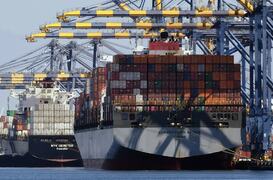Pakistan Seeks Increased Trade with US, Eyes Removal of Trade Barriers
Islamabad is aiming to enhance its trade relationship with the United States by procuring more American goods like cotton and soybean, and by dismantling non-tariff obstacles to mitigate the impact of tariffs imposed during President Donald Trump’s administration, according to Finance Minister Muhammad Aurangzeb.
In a recent interview, Aurangzeb stated that Pakistan welcomes foreign direct investment (FDI) from American enterprises, particularly in its newly accessible minerals and mining sectors. Furthermore, the nation plans to introduce its inaugural Panda bond, projected to be between $200 million and $250 million, later this year.
Aurangzeb highlighted Pakistan’s endeavors to stabilize its economy following its near-default situation in 2023. The nation has secured initial approval for a $2.3 billion loan from the International Monetary Fund (IMF), ensuring financial predictability until 2027.
The finance minister emphasized Pakistan’s commitment to procuring more goods from the US and eliminating non-tariff barriers in an effort to circumvent the high tariffs established by President Trump. He stated, “We are considering a broader perspective in our engagement with the US,” and noted that a formal delegation would be dispatched.
Aurangzeb specified that Pakistan is interested in importing more cotton and soybean from the US and is engaged in discussions to dismantle non-trade barriers, thereby opening its markets to a greater influx of US products.
He also mentioned the possibility of addressing any challenges related to non-tariff discussions, including potentially burdensome inspections of US products at Pakistan’s end.
Islamabad is actively working to foster goodwill with the US to potentially gain relief from the 29% reciprocal tariffs implemented by President Trump. While these tariffs are currently suspended until July, Pakistan intends to dispatch a trade delegation to Washington in the coming months to reduce the trade disparity. The US stands as Pakistan’s primary export destination, with annual exports exceeding $5 billion as of 2024, while Pakistan’s imports from the US amount to approximately $2.1 billion.
Aurangzeb reiterated the country’s receptiveness to FDIs from US companies in its recently liberalized minerals and mining industries.
Aurangzeb, a key advisor to Prime Minister Shehbaz Sharif, is currently in the US for a week-long visit to participate in the Spring Meetings of the IMF and the World Bank.
The former JP Morgan Chase & Co executive indicated that Pakistan intends to utilize international capital markets to secure additional funding for sustainable growth. He stated, “Our aim is to break free from the cyclical pattern of boom and bust that Pakistan has experienced and transition towards a path of sustainable growth.”
Pakistan is in the process of launching its first Panda bond, estimated to be in the range of $200 million to $250 million, with the issuance likely occurring in the fourth quarter of the current year. Recently, Fitch Ratings upgraded Pakistan’s credit rating, expressing confidence in the nation’s ability to sustain reforms under the IMF loan program.



Comments (0)
No comments yet. Be the first to comment!
Leave a Comment